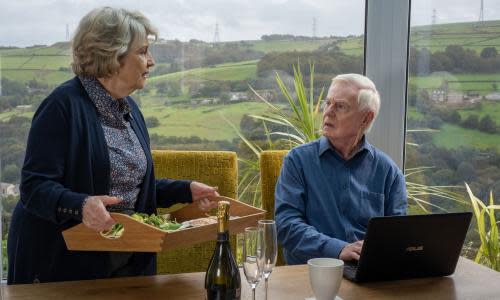Last Tango in Halifax review – a brilliant, bittersweet Sunday comfort

When it comes to writing about family, nobody does it better than Sally Wainwright. It has been eight years since Last Tango in Halifax (BBC One) began, and just over three since we caught up with Alan, Celia, Gillian and Caroline. The reunited octogenarians are still married, but now they are arguing over a new kitchen and how smart a spare room needs to be for a last-minute guest. The daughters are navigating their own successes, or lack of them, and wondering how it might be possible for a YouTuber to review a sheep.
This opening episode is deceptively slight. Alan and Celia are bickering, Caroline has a dog, a young daughter and job satisfaction, and Gillian is worried about money and how she can keep the farm going. Alan’s brother, Ted, is planning to visit from New Zealand, and John is bitterly slogging his way through Judith’s alcoholism and success as a children’s author. For the most part, that is all that happens. But Last Tango has always been the sort of series to wrongfoot you, just when you settle in; while it is cosy and familiar in many respects, a warm blanket of Sunday-night comfort, it is always just a step away from a surprisingly serrated edge.
When Alan decides to apply for a job, Celia can’t hide her mortification at the thought of him working in a supermarket, and then at the thought of him getting a bus to work. (She will be requiring the Lexus.) Anne Reid’s ability to play an affronted snob is unparalleled, and it leads to some of the funniest lines in the episode. She worries he will be waiting at the bus stop, “getting wet through, or dehydrated, now that we’ve got global warming”. Caroline protests that she likes buses, too, only to crumble and reveal that, actually, she went on a sightseeing bus, in Barcelona, once. Derek Jacobi gives Alan a bleeding heart that peppers the tone with pathos: he points out that the tills staffed by people, rather than automated checkouts, might be the only place a lonely person will speak to someone else all day.
Alan seems lonely himself, even when he is with Celia, and I am more worried about their relationship than I am for the marriages of some people I know in real life. Caroline and Gillian are aware that Celia runs rings around Alan, but their parents lack of shared values is starting to loom large. Celia feels entitled to enjoy her retirement in comfort, and a little excess. Alan worries about “understaffed, underfunded” social services and befriends a young, hungry shoplifter. When Gillian asks to borrow money from her father, it lights a fuse under this fundamental disagreement and it’s hard to imagine it will fade away without a bang.
All of the characters seem to be asking themselves whether or not they are happy. Caroline, now the single parent of her dead wife’s daughter, Flora, discovers, to her surprise, that she is happier than she has ever been. She has made such a success of her school that Michelle Obama popped in last year. While I thought they might be hinting that Caroline would get back together with her ex-husband John, and braced myself just in case, her affections are instead pointed at a Shakespeare-loving teacher having her own marital issues. Caroline’s dog is called Ruth, and it is an indication of the tone that this manages to be very funny indeed. Gillian, meanwhile, is stretched to the limit financially, and a nasty case of woodworm leaves her desperate for money to save the farm. When Celia rebukes her for asking Alan, it is with such palpable sharpness that I felt like hissing at the screen. But the art of Last Tango is that it presents both sides without judgment. Money leads to resentments within even the most stable of families. You can’t blame Celia for being selfish at this point in her life, nor can you blame Alan for wanting to help his daughter in a time of crisis, even if you want to have a stern word with both of them.
This is warm and welcoming drama and, despite its long-ish absence, its characters feel instantly familiar again. To pick it up after three years is like checking in with old friends. It is far less sentimental than it looks, and it raises the kinds of questions about family and domesticity – how much is compromise, and how much is a slog? – and also morality that demand more than just a passing consideration. It would be crass to suggest that Last Tango stands as a metaphor for the state of the nation, when, really, it is a good, solid Sunday-night drama, but at a time when we appear to be weathering a seemingly insurmountable divide in values, it is particularly pointed to see it playing out on screen among such a beloved couple. I only hope Wainwright doesn’t split them up. I don’t think I could bear it.

 Yahoo News
Yahoo News 